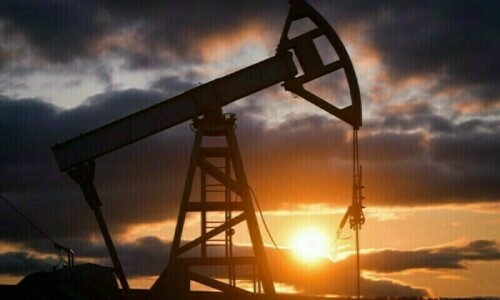KARACHI: Political uncertainty took a toll on the stock market in the outgoing week.
According to Arif Habib Ltd, the rupee continued to depreciate and reached an all-time low of 228.37 amid a depletion of foreign exchange reserves and uncertainty over funding from friendly countries.
Moreover, the International Monetary Fund (IMF) is assessing as to which friendly countries are willing to provide financial aid to Pakistan before it can disburse the $1.17 billion tranche.
In addition, ratings agency Fitch downgraded Pakistan’s outlook to negative. However, a slight rebound was observed on the last trading day of the outgoing week.
The stock market closed at 40,077 points, losing 1,998 points or 4.75 per cent from a week ago.
Despite strong assurances from the State Bank of Pakistan (SBP), the currency and share markets have been in deep turmoil amid uncertainty about the future course of the economy.
The rupee appreciated to 204.56 in the first week of July after touching 211.93 on June 22. It kept losing its value against the dollar but registered a minor appreciation when the country reached its staff-level agreement with the IMF on July 15.
According to a research note issued by AKD Securities over the weekend, there still seems to be a “funding gap for 2022-23 expenditures” even though the government has reached a staff-level agreement with the IMF.
In the outgoing week, there was an 11-rupee change in the exchange rate in just two days — a sharp decline in the rupee’s value that the SBP attributed to the “market-determined exchange rate system”.
The central bank said the depreciation in the rupee “since December 2021 has only been 3pc”. In nominal terms, however, the local currency has depreciated against the dollar by 18pc over the same period.
“Until future funding from lenders/partners is ensured, the domestic currency is expected to remain volatile, subsequently keeping investors’ confidence muted,” it added.
But a recent slump in commodity prices may be a positive development for the country’s external account. The brokerage also drew attention to lower oil prices to claim that they may give the government some space to start collecting petroleum development levy and sales taxes on retail fuel without putting additional burden on consumers.
Sector-wise, negative contributions to the index came from commercial banking (499 points), fertiliser (294 points), cement (245 points), oil and gas exploration (187 points) and power generation and distribution (110 points).
Sectors that contributed positively to the benchmark were sugar and allied industries (three points) and close-end mutual funds (two points).
Scrip-wise, negative contributors were Habib Bank Ltd (152 points), Lucky Cement Ltd (92 points), Engro Corporation Ltd (92 points), Engro Polymer and Chemicals Ltd (91 points) and the Hub Power Company Ltd (90 points).
Meanwhile, scrip-wise positive contributions came from Shakarganj Ltd (three points), HBL Growth Fund (two points), Highnoon Laboratories Ltd (two points), Murree Brewery Company Ltd (one point) and Dolmen City REIT (one point).
Foreign buying was witnessed in the outgoing week, clocking in at $3.43 million versus a net purchase of $1.4m last week.
Major buying took place in technology ($1.98m) and “other sectors” ($0.75m).
On the local front, selling was reported by mutual funds ($7.76m) and insurance companies ($2.22m).
The average daily volume clocked in at 163m shares, down 8pc week-on-week. The average daily value traded settled at $21m, down 31pc from a week ago.
According to AKD Securities, market activity is expected to remain slow as investors seek an end to uncertainty on the macroeconomic and political fronts. “We recommend market participants should stay cautious and focus on defensive plays. Any good bull run should be taken as an exit point,” it added.
Published in Dawn, July 24th, 2022













































Dear visitor, the comments section is undergoing an overhaul and will return soon.